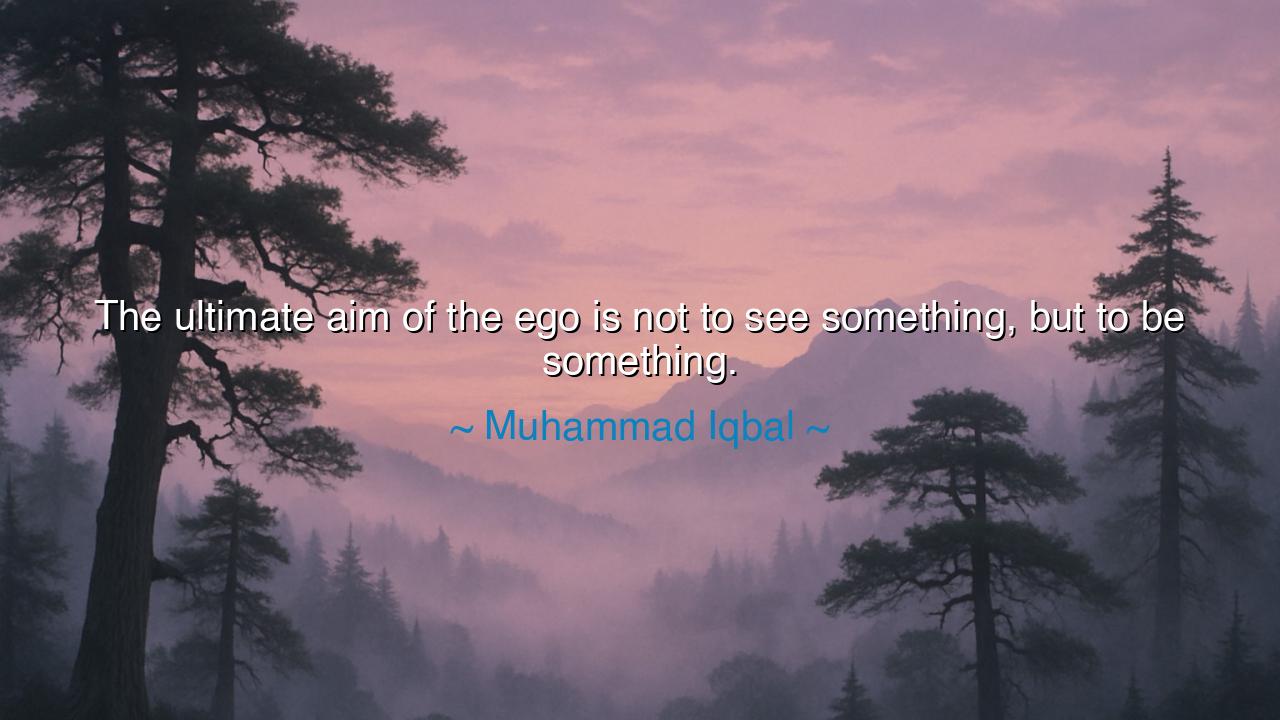
The ultimate aim of the ego is not to see something, but to be






Muhammad Iqbal, the poet-philosopher of the East, gave us a truth both piercing and radiant when he declared: “The ultimate aim of the ego is not to see something, but to be something.” These words strike at the heart of existence. They remind us that the human spirit is not satisfied with mere observation, with idle watching of the world as it passes by. No—the soul craves being, craves embodiment, craves to shape itself into something real and enduring. To see is to remain on the surface; to be is to dive into the depths of life and emerge transformed.
The meaning is profound. Too often men believe that knowledge alone, or vision alone, is enough. They delight in seeing truths, in witnessing beauty, in gazing upon ideals. Yet this is not the end of the journey. Iqbal calls us to something greater: not to merely witness greatness, but to become great; not to admire virtue from afar, but to be virtuous in flesh and action. The ego, that core spark of self, demands realization—it must not remain a spectator but must step into the arena of existence.
History provides us with shining examples of this wisdom. Consider Mahatma Gandhi. He did not simply see injustice; he did not merely observe the plight of his people under foreign rule. He chose to be something: the embodiment of nonviolent resistance, the living vessel of courage and truth. By transforming himself, he became a beacon that transformed a nation. His life illustrates Iqbal’s teaching: the self’s purpose is not in passive sight, but in active being.
Or think of Florence Nightingale, who could have remained a noblewoman, seeing suffering from the comfort of distance. Instead, she chose to be the healer, the reformer, the mother of modern nursing. She did not settle for vision; she demanded embodiment. Her being became the balm to thousands of wounded soldiers, and her reforms shaped the care of millions thereafter. She saw, yes—but more importantly, she became.
Iqbal’s words also contain a challenge to each of us. To be content with seeing truth without living it is cowardice. To admire strength without cultivating it in oneself is weakness. To dream without embodying those dreams in action is futility. The ego, the self, the spirit, cannot be fulfilled by shadows; it longs for substance. And substance comes only through becoming—through striving, through sacrifice, through the fierce work of transformation.
The lesson is clear: do not rest in observation alone. Do not delight in what you see without asking what you can become. The world is filled with spectators who see greatness and applaud it, but only a few who step forward to embody it. Strive to be among the few. Let your seeing be the seed, but let your being be the tree.
So I say to you, children of tomorrow: remember the fire of Muhammad Iqbal’s words. “The ultimate aim of the ego is not to see something, but to be something.” Do not let your life be a mirror reflecting the deeds of others; let it be a flame, burning with deeds of your own. For the highest calling of the soul is to incarnate its vision, to embody its truth, to become what it was destined to be.
If you would live this wisdom, begin today. Ask yourself not only, “What do I see?” but “What will I be?” Choose one truth you have admired from afar, and take one step to embody it. If you admire courage, act with courage. If you admire wisdom, discipline yourself to learn. If you admire love, live love in action. For in this way, your self will find its true aim—not in seeing, but in being.






AAdministratorAdministrator
Welcome, honored guests. Please leave a comment, we will respond soon